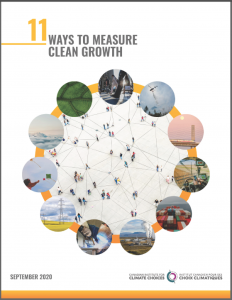 As Canadian governments work to revive the economy in the wake of the COVID-19 pandemic, a new report from the Canadian Institute for Climate Choices examines how economic, social, and climate objectives are connected. Drawing on various sources of data, the report demonstrates how progress on climate change and efforts to drive prosperity can be mutually reinforcing.
As Canadian governments work to revive the economy in the wake of the COVID-19 pandemic, a new report from the Canadian Institute for Climate Choices examines how economic, social, and climate objectives are connected. Drawing on various sources of data, the report demonstrates how progress on climate change and efforts to drive prosperity can be mutually reinforcing.
The report, 11 Ways to Measure Clean Growth, aims to help governments understand how climate change interacts with factors that contribute to society’s long-term resilience and prosperity—such as GDP growth, technology development, trade, jobs, reduced poverty, affordable energy, improved air quality and ecosystem health. According to the report, expanding how governments measure progress is key to adopting policies that grow the economy and make Canadians better off while addressing climate change.
The data shows that Canada is making headway in reducing greenhouse gas emissions while growing the economy, creating new employment opportunities in low-carbon sectors, and increasing investment in and demand for clean technology innovation and trade. Yet the Institute’s 11 indicators also highlight where progress on clean growth has been slow and uneven across regions, sectors and socio-economic groups. For example, the economies of several provinces remain closely tied to greenhouse gas emissions, and low-carbon technology adoption has been limited in sectors such as transportation. By explicitly connecting climate, economic, and social objectives when designing or implementing policy, governments can address these challenges and avoid disadvantaging lower-income Canadians and communities that have reduced capacity to adapt to climate-related risks.
The report also identifies significant data gaps that limit governments’ ability to clearly track clean growth progress. Successfully tackling ambitious climate objectives, such as Canada’s commitment to achieve net zero greenhouse gas emissions, while supporting economic recovery and long-term prosperity, requires more investment in the data needed to support smart decisions.
“There are two major threats to Canadian prosperity: a global recession in the short term, and climate change longer-term. If we don’t address them together, we can’t succeed at either one. This research provides a compass pointing the way to better policy—policy that supports the twin goals of climate progress and prosperity.” —Kathy Bardswick, President, Canadian Institute for Climate Choices
 “Climate progress isn’t practical or durable unless it also supports a strong economy. Our goal was to figure out what it takes to achieve clean growth, and how to measure progress. The data shows it’s possible to grow the economy while addressing climate change—as long as policy is designed to achieve environmental, economic and social benefits simultaneously. Otherwise, progress in one area could cause setbacks in the others.” —Rachel Samson, Director, Clean Growth at the Canadian Institute for Climate Choices
“Climate progress isn’t practical or durable unless it also supports a strong economy. Our goal was to figure out what it takes to achieve clean growth, and how to measure progress. The data shows it’s possible to grow the economy while addressing climate change—as long as policy is designed to achieve environmental, economic and social benefits simultaneously. Otherwise, progress in one area could cause setbacks in the others.” —Rachel Samson, Director, Clean Growth at the Canadian Institute for Climate Choices
Links
SOURCE Canadian Institute for Climate Choices
- Thursday Morning News – February 19 - February 19, 2026
- Wednesday Morning News – February 18 - February 18, 2026
- Bus Cancellations – Batchawana Eastwards - February 18, 2026
 Wawa-news.com Local and Regional News
Wawa-news.com Local and Regional News

